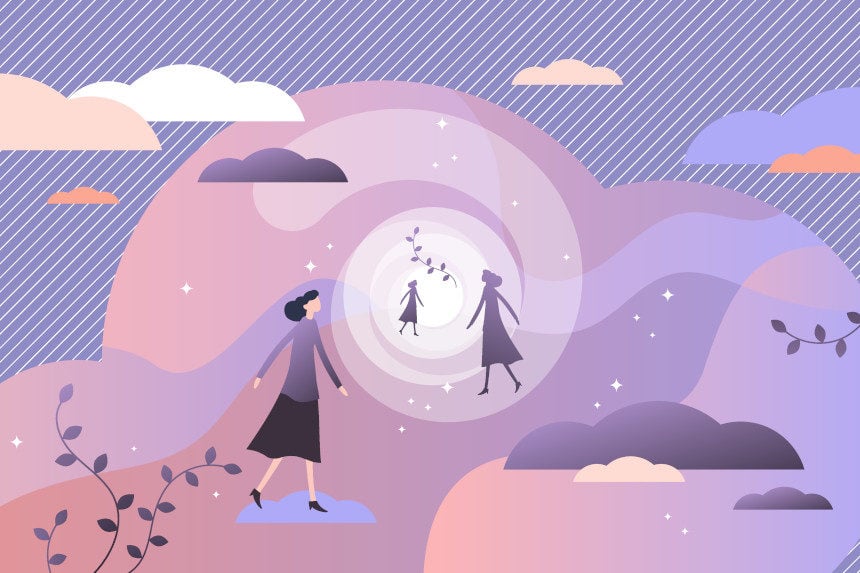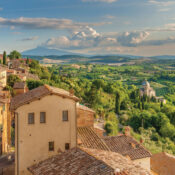The shrapnel entered through the armhole of Steve Price’s bulletproof vest just as he was firing his rifle, and a mortar fragment pierced his lung. When the medics finally reached him, they airlifted the 24-year-old Marine from the Vietnamese jungle to a military hospital in the Philippines for surgery.
The burly, heavily tattooed, self-described schoolyard bully became tearful when he described to me what happened during the operation: “Suddenly I realized I was up near the ceiling, looking down at my body. A brilliant white light embraced and encompassed me. It took me in. I felt such warmth and peace and was bathed in the most peaceful, joyous feeling imaginable. I found myself in a place like the Garden of Eden. I didn’t say the word God for a long time, but now I can say that the light was God. It was like the most loving mother embracing her infant, only a million times more than that. On the other side of a stream bubbling through the garden was my long-dead grandfather. I went to move toward him, but it was over.”
After his recovery, he tried to return to battle but found that was difficult: “I led my unit. I did all the things I was supposed to, but I couldn’t shoot my gun. All I ever wanted was to be a Marine, but I realized I could no longer do my job. Eventually, I left the Marines and now I work as a lab technician. I joined the National Guard, because it helps people instead of killing them. I’m now mild-mannered, thoughtful, and a lot different from the hard-charging, macho Marine I once was. I’ve become so sensitive that when other people hurt I can feel it. I talk to people about metaphysical things. Before, I would’ve made fun of people who talked about such things.”
In my 45-year career of studying such near-death experiences (NDEs), I discovered that they are common, and play no favorites. Even neuroscientists have them. And I discovered, over almost a half-century of struggling to understand NDEs, that their impact extends far beyond the individual experiencer. Many experiencers, like Steve, report that after their near-death experiences, their previous lifestyle no longer felt comfortable to them or was no longer fulfilling. As a result, some do change their professions, as Steve did. Among the experiencers I’ve studied, one-third changed their occupations as a result of their NDEs, and three-fourths reported a marked change in their lifestyle or activities. These changes are most dramatic with experiencers who had been in a profession that involves violence before the NDE, such as law enforcement or the military.
Joe Geraci, a 36-year-old policeman who almost bled to death after surgery, described a life change comparable to Steve’s after his NDE: “I was a no-nonsense, hard-nosed cop. My NDE changed all that. I left the hospital a completely different man. After being a cop used to bloodshed, I found I could not watch TV because it was too violent. After endangering myself and my partner on patrol because I couldn’t fire my gun, I quit the police force and retrained as a teacher. Although I found teaching high school fulfilling, I often found myself reprimanded for becoming too involved in my students’ personal lives.”
This kind of attitude change that results in a career shift also occurs in people whose prior profession was based on competition. Emily had an NDE at age 49 when she almost drowned while swimming in the Gulf of Mexico. She described her loss of a “killer” instinct and values after that event: “I am a very successful real estate broker of 17 years. Since this event, I have now given my business over to one of my sons and have joined the Lutheran Church Home, where I am marketing housing for the elderly. I can honestly say that each day I now live to the fullest and would never, never be afraid of dying. It can only be a superb trip!
“This experience has left me with a heightened compassion and intense feeling that anger and hatred are wrong and wasted emotions. The joy of being alive took away a big part of the feisty attitudes I was known for; the ‘killer’ instinct to do a deal was gone! Making big bucks is no longer a priority. The empathy of helping people hurting is from the heart. I treasure time with my sons as never before. I used to walk out on family get-togethers to ‘make a deal,’ but no more! Material things are simply not worth the hassle anymore. And I never miss the chance to tell those I love how much I care; I might not have another chance.”
Interestingly enough, these claims by experiencers that they no longer feel addicted to worldly things doesn’t mean that they give them up. In fact, many of them say that because they no longer feel driven to accumulate possessions, they paradoxically feel freer to enjoy material pleasures more fully. They don’t renounce worldly possessions, but they feel less attached to them. They no longer define themselves by what they own.
One day, Tom Sawyer, a highway department supervisor whose truck crushed his chest, arrived for a meeting at my home with an ear-to-ear grin, having driven five hours in his Cadillac Eldorado. True, it was a used car, but owning such an extravagant car didn’t seem to fit my image of a blue-collar worker who claimed to have no interest now in material possessions. He didn’t see the contradiction. He said he enjoyed the luxurious seats and handling of the Eldorado, far more pleasurable than any car he’d ever driven. It was his enjoyment of all life had to offer, including its pleasures like sweet tastes and smooth rides, and not his desire to own things, that had led him to buy this used Cadillac. And sure enough, when a couple of years later he could no longer keep up the payments, he didn’t blink an eye when it was repossessed. Owning the Cadillac was never the point. It was all about the thrill of driving it for a while.

Of course, people who have NDEs are still people just like the rest of us, complex mixtures of emotions and thoughts, good and bad, pleasant and unpleasant, altruistic and selfish. Tom was a perfect example. His wife, Elaine, talked about the mixed blessing of his NDE. Her dark eyes flashing, she described what he was like before his NDE: “He was violent, throwing shoes and things at me, shouting that he was the head of family and we had to do whatever he said.” Then she smiled and added, “But after his NDE, he’s become compassionate, gentle, and considerate. He hasn’t raised a hand to me or the kids once in all the years since.” On the other hand, she complained that he now treated everyone with that same loving compassion, and at times she felt neglected because he was off helping a stranger in need. Shaking her head, she said, sighing, “He couldn’t care less about the fact that our sofa is falling apart and we need a new one. We have the money saved to buy one, but he doesn’t see the point.”
Just as NDEs don’t turn people into saints, so too life after NDEs is not all rainbows and butterflies. I found that NDEs sometimes result in serious problems. How could such a profound experience that differs so radically from everyday life not lead to problems as well? In fact, not all the aftereffects of NDEs are positive. Some experiencers have difficulty reconciling their NDEs with their religious beliefs. Some find it hard to resume their old roles and lifestyles, which no longer have the same meaning, or to communicate to others the impact of the NDE. Some experiencers report anger at still being alive — or at being alive again.
Cecilia, a 61-year-old teacher, began vomiting so violently one night that she felt an enormous rip in both her sides. The pain was excruciating, her fever rose rapidly, and she could not stop shaking. Her teeth rattled, and no amount of blankets could keep her warm. Her husband drove her to the hospital, where an X-ray showed a fist-size mass on her right side. She underwent surgery, which found a gangrenous appendix that had ruptured, causing a widespread infection in her abdominal cavity. She described a near-death experience as her fever raged:
“I felt myself being transported into what I can only attempt to describe as universal blackness. It was as though I had been transported into outer space and was looking down at what I knew was Earth. It appeared as a globe with a bluish glow to it. It was about the size of a child’s large rubber ball from the vast distance I had traveled. I received the message, ‘It’s okay to go. The seeds have been planted; your work will go on.’
“I experienced a wonderful feeling of peace and freedom. I saw my students going out and assisting others, and I knew the work I loved would go on without me. I had a sense of how small we are as individuals in this vast universe. Of course, people close to me would mourn my death, but in reality my passing would be as insignificant as one less grain of sand on Earth, or one less drop of water in the ocean. Death is nothing to fear. It brought me an incredible feeling of love and peace. I also saw how insignificant are the material things we leave behind us. I felt ready to go, reached my arms out to two spirits who were in the room watching, waiting — and then they began to back away, leaving me behind! I pleaded, ‘Here I am; take me with you,’ as they gradually faded away.”
But Cecilia’s blissful experience ended with a return to her pain-racked body: “My journey back into the real world began. My recovery proved slow and tedious. My body was healing, but I regretted that I had not died. The magnificent peace that I had experienced was something I could not shake. I went through weeks of depression. Everything became such an effort: dressing myself, tying shoes, chewing food, swallowing, driving a car, turning the wheel, walking up stairs, turning doorknobs, walking, walking — everything, even talking! Carrying around the physical body just seemed like too much effort. I remember thinking I might have to wait another 20 years before I would have another opportunity like that. I knew of course that death must come naturally in order for me to enjoy such peace.
“I bought myself a notebook … My first entry was written to God in anger. I asked, ‘Why am I alive?'”
“I did not know how to climb out of this hole. It just seemed to be getting deeper and deeper. I looked everywhere I could in a desperate attempt to find answers. I bought myself a notebook to keep a journal of how I was to get through this. My first entry was written to God in anger. I asked, ‘Why am I alive?’”
It can be particularly difficult for parents to understand and accept the aftereffects of NDEs in their children. Kenny was a teenager whose heart stopped when he was shocked by a freak spark jumping from a high-voltage power line. He had an NDE with both heavenly and hellish visions, and felt he had been saved by Christ and sent back with a mission.
His parents had brought him to see me because he felt estranged from his school friends, who didn’t understand why he had changed. I brought Kenny to the experiencer support group and he in turn brought his parents, who were confused when their popular, outgoing son lost interest in high school sports, rock music, and socializing with his friends and became focused instead on developing life goals that felt more meaningful to him. Their struggle to understand what he and they were going through kept them coming to the support group long after Kenny himself stopped.
It is not unusual for family and friends to find that their attitudes, beliefs, and behaviors change as a result of intimate exposure to experiencers. And the same is true, I found, for near-death researchers. Immersing myself in near-death experiences has pushed me to grow and change my view of who we really are as human beings. The more I learned about NDEs, the more they seemed to cry out for an explanation beyond the limited understanding of our everyday ideas about the mind and the brain. And those new ways of thinking about our minds and our brains open up the possibility of exploring whether our consciousness might continue after the death of our bodies. And that, in turn, challenges our concept of who we are, how we fit into the universe, and how we might want to conduct our lives.
Bruce Greyson, M.D., is the Professor Emeritus of Psychiatry and Neurobehavioral Sciences at the University of Virginia School of Medicine. He was a co-founder of the International Association for Near-Death Studies and an editor-in-chief of the Journal of Near-Death Studies.
From After by Bruce Greyson. Copyright © 2021 by the author and reprinted with permission of St. Martin’s Press.
This article is featured in the November/December 2021 issue of The Saturday Evening Post. Subscribe to the magazine for more art, inspiring stories, fiction, humor, and features from our archives.
Featured image: Shutterstock
Become a Saturday Evening Post member and enjoy unlimited access. Subscribe now




Comments
About 7 years ago my heart stopped and I died. Every thing was black the deepest black ever experienced, no pain, no conscious thought, only peace. I awoke wondering, what happened, looking at the stars in the sky. It was light when I collapsed. Scratches on my arms, knees, forehead my wife said “what happened to you?” when I returned into the house. Now a pacemaker, medications, and electric cardioversion, everyday control the anomalies that interfere with my heart. Twenty years ago diagnosed with stage 4 cancer and told with treatment maybe 2 to 5 years of life. Having faced death before, both of these happenings changed my life. Trying to live every day as my last and accepting GODS plan.
I am a Unitarian/Universalist and believe that everyone has the right to study and believe how we pass on and to what other state of existence. Any religion that says it’s the only way to eternal life is asinine. No one, no one knows what’s in store for us or even if there is such a thing, If these NDEs teach us anything, it’s to be kind to others as well as ourselves.
I am a hardcore believer of all these experiences. My personal experience convinced me that there is something after people die. Is it after life, I can not tell. But I think the human beings are charged with the special kind of energy. This energy is infinite. When we die it is just a transformation of the energy into another form. In 2007 I was very sick after I got cold. I obviously had a very high temperature and I was taking antibiotic. During the night I was not able to sleep and I had something they call, dreaming with open eyes. I saw a man, dressed as a catholic monk. To this moment i still remember his face, it was beardless and it was showing that he is highly compassion with my miserable state. The men came close to my bed, looked at me, something like a light smile flashed on his face, and he took away. Originally I am not a very religious person. In the morning I told my wife about my night gest. she said, that it was may be a hallucination because of the high temperature. I do not know, but what happened that night, was so real. I had the feeling that I can touch this monk, his attire was so real, the rope belt and his livebly face.
In 2006, I started feeling like I had a cold coming on, and it turned into a chest cold. I went to the doctor, and he confirmed it for me, and gave me a few days of pain killers. About 10 days into it, I took my temp before going to bed, and I noticed it was a little elevated, but nothing to worry about. I went to bed, and woke up in the I.C.U. of our hospital with a trachea line, a feeding tube, a pick line, and a doctor looking at me saying, “Well, Craig, I see you’ve woken up. Welcome to the I.C.U. unit of Lutheran Hospital.” I could not move anything, so I nodded. It turned out I was in a coma for 2 weeks due to the H5N1 Bird Flu that I believe I got from a friend who was staying in China near a Hospital. Little by little, the past 2 weeks of “dreams” would come to me, and impact my life in a way that I cannot explain. I first had to spend 2 months learning to move and walk again. To this day, I still walk with a cane, and have half my hearing due to the very strong anti-biotics given to me, but I am alive. In the next 3 years, my wife and I adopted a girl, I went mountain climbing twice in Alaska, along with salmon and halibut fishing. I took up artistic photography, and playing the guitar (who hasn’t?). I lived more in the years after I died, than I ever did before.
This article features a variety of experiences we can all learn from. They’re not all alike by any means even though most do seem to share at least some commonalities.